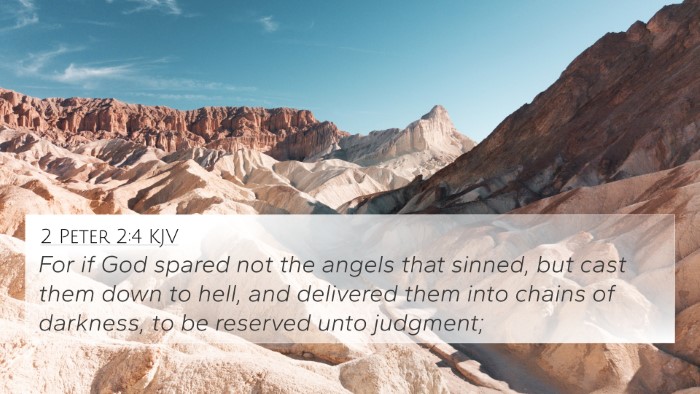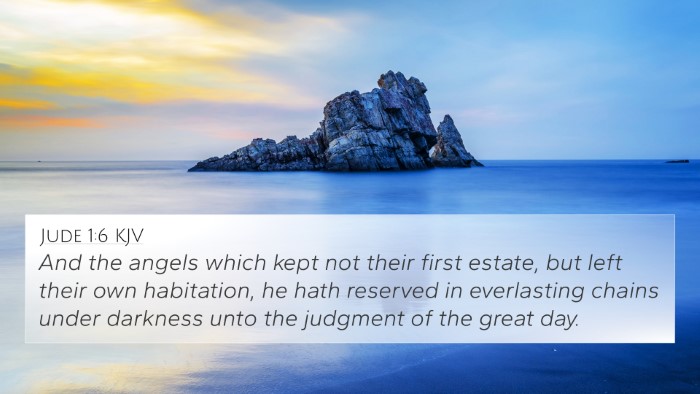Old Testament
Genesis Exodus Leviticus Numbers Deuteronomy Joshua Judges Ruth 1 Samuel 2 Samuel 1 Kings 2 Kings 1 Chronicles 2 Chronicles Ezra Nehemiah Esther Job Psalms Proverbs Ecclesiastes Song of Solomon Isaiah Jeremiah Lamentations Ezekiel Daniel Hosea Joel Amos Obadiah Jonah Micah Nahum Habakkuk Zephaniah Haggai Zechariah MalachiJob 4:18 Similar Verses
Job 4:18 Cross References
Behold, he put no trust in his servants; and his angels he charged with folly:
Uncover the Rich Themes and Topics of This Bible Verse
Listed below are the Bible themes associated with Job 4:18. We invite you to explore each theme to gain deeper insights into the Scriptures.
Job 4:18 Cross Reference Verses
This section features a detailed cross-reference designed to enrich your understanding of the Scriptures. Below, you will find carefully selected verses that echo the themes and teachings related to Job 4:18 KJV. Click on any image to explore detailed analyses of related Bible verses and uncover deeper theological insights.

2 Peter 2:4 (KJV) »
For if God spared not the angels that sinned, but cast them down to hell, and delivered them into chains of darkness, to be reserved unto judgment;

Jude 1:6 (KJV) »
And the angels which kept not their first estate, but left their own habitation, he hath reserved in everlasting chains under darkness unto the judgment of the great day.

Job 25:5 (KJV) »
Behold even to the moon, and it shineth not; yea, the stars are not pure in his sight.

Job 15:15 (KJV) »
Behold, he putteth no trust in his saints; yea, the heavens are not clean in his sight.

Psalms 103:20 (KJV) »
Bless the LORD, ye his angels, that excel in strength, that do his commandments, hearkening unto the voice of his word.

Isaiah 6:2 (KJV) »
Above it stood the seraphims: each one had six wings; with twain he covered his face, and with twain he covered his feet, and with twain he did fly.
Job 4:18 Verse Analysis and Similar Verses
Understanding Job 4:18
Job 4:18 states, "Behold, he put no trust in his angels; and his angels he charged with folly." This verse presents significant implications regarding the nature of God, angels, and the human condition. Below, we delve into a comprehensive interpretation of this scripture utilizing insights from Matthew Henry, Albert Barnes, and Adam Clarke.
Meaning and Interpretation
This verse stems from the speech of Eliphaz, who is one of Job's friends. Eliphaz seeks to provide insight into Job's suffering by suggesting that even celestial beings are subject to God's judgment.
- Divine Sovereignty: The reference to God not trusting His angels illustrates His absolute authority. According to Matthew Henry, this highlights a profound aspect of God's nature—that even the highest beings in creation (angels) are not infallible and are in need of His oversight.
- Folly Among Angels: Albert Barnes describes the term 'folly' as a reminder that even angels are not exempt from wrongdoing. This emphasizes that God maintains individual judgment over all beings, including those who dwell in the heavenly realm.
- Human Condition: Adam Clarke points out that this verse serves as a reflection on humanity's condition. If even angels are crisp and vulnerable to folly, the implication is that humans, made lower than the angels (Psalm 8:5), must be cautious and aware of their limitations.
Cross-References
To appreciate the thematic connections in the Bible and the concept of divine judgment across different scriptures, we can cross-reference the following verses:
- Psalm 8:5 - Discusses the position of humanity in relation to angels.
- Hebrews 2:7 - Affirms the lower status of humanity compared to angels.
- Matthew 25:41 - Christ speaks about judgment and eternal fire prepared for the devil and his angels.
- Jude 1:6 - Mentions angels who did not keep their proper domain but left their own abode, and they are kept in judgment.
- Isaiah 14:12-15 - A prophecy concerning the downfall of a high-ranking angelic being, illustrating divine justice.
- 2 Peter 2:4 - Talks about God not sparing angels when they sinned but casting them down to hell.
- Revelation 12:7-9 - Describes a war in heaven and the victory of God's angels over the dragon (Satan).
Thematic Connections
The themes observed in Job 4:18 illuminate broader biblical concepts of judgment, responsibilities of created beings (including angels), and the overarching sovereignty of God across the scriptures.
In light of cross-references provided, we can consider the implications of such truths:
- The fidelity of God's oversight extends to all creation—therefore, a question arises for humans about their own accountability.
- As angels are subject to God's authority, all beings must submission to divine wisdom and governance, establishing a key theme of humility before God.
- While angels are often viewed as mediators between God and humanity, this verse serves as a solemn reminder of their limitations.
Conclusion
In conclusion, Job 4:18 provides a rich tapestry for understanding the dynamics of divine judgment, the role of angels, and the implications for human behavior. The insights from public domain commentaries offer an understanding that transcends the specific time of Job’s lamentation and reverberates through scripture, reminding us of the complex relationship between the Creator and His creation.
Through a careful study and cross-referencing of the Bible verses, one can discover a pattern of accountability and divine authority that is applicable to all of humanity. This verse, thus, not only sheds light on God’s governance but also calls for introspection on human actions and beliefs.



